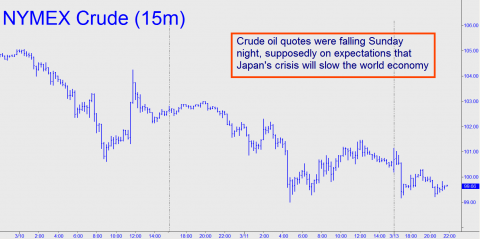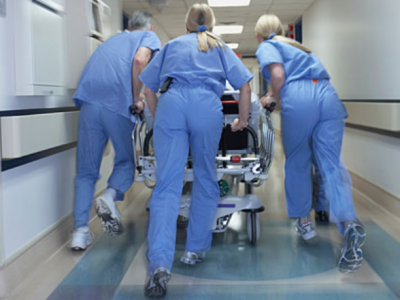Late Sunday night, Tokyo stocks were getting savaged even as Reuters reported there was little evidence of short-term “funding shortages” in Japan’s financial system. The Nikkei Average initially dropped nearly 500 points, to 9756, when trading began, but it remained to be seen how U.S. stock would react. As of around 11:30 p.m., S&P Index futures had been down as much as 14 points, equivalent to about 100 Dow points. However, such moderate selling is usually a sign that institutional buyers are bullish and merely trying to shake loose some bargains ahead of Monday’s opening. Whatever the case, Monday is not likely to be a yawner, even though Wall Street has managed to shrug off a few other epic disasters ever since this seemingly unstoppable Mother of All Bear Rallies began exactly two years ago. On Friday, a day before earthquake/tsunami news from Japan went “nuclear,” shares of American multinationals that could conceivably benefit from the rebuilding of Japan actually rose, callous as that might seem. But we should have grown accustomed by now to seeing things the way investors see them, with dollar signs coloring even the most horrific spectacles.
Still, and most unfortunately, it’s possible this disaster will turn out to be worse than all others of recent memory combined. A “CollapseNet”(?) e-mail bulletin we received from a Belgian subscriber Saturday evening put things in the starkest possible terms, conjuring up a radioactive cloud that the Jet Stream would eventually disperse to all seven continents. The alert advised anyone living on the U.S. West Coast to secure potassium iodide pills as a precaution against moderate exposure to radioactivity. Although the warning seemed a bit extreme, we nonetheless inquired about the substance at the local Walgreen’s. The product supposedly is available over-the-counter, but this store had none of it, and the pharmacist was clueless as to why anyone would even want it.
The Well-Stocked Survivalist
Readers will recall that, just last week, we published some survivalists tips related to food storage in anticipation of a possible emergency. While potassium iodide might turn up on a list of items that every well-stocked emergency cabinet should contain, like a snake bite kit, it is something we would not ordinarily expect to use. But given the events of this weekend, including a new explosion within the hour at the already-stricken Fukushima Daiichi nuclear power plant, we can no longer dismiss the possibility of a world-contaminating nuclear meltdown. The Fukushima explosion is reported so far as “unlikely” to have released a “large amount” of radiation into the atmosphere. Granted, the news could have been a whole lot worse, but it is hardly reassuring that powerful after-tremors that would have been big news by themselves just a week ago continue to rock Japan, reactors and all.
Meanwhile, Brent crude is down almost $3 on speculation that Japan’s troubles will slow the global economy. Past experience suggests otherwise, since buyers of stocks have only been rewarded when they accumulated aggressively – i.e., shares of BP at low ebb during the worst of the Gulf oil spill — whenever major disaster struck. This time, though, given the potential of Japan’s already considerable troubles to spin out-of-control, it may be premature to buy stocks hand-over-fist. The Japanese are infinitely resourceful, and they have been preparing for this earthquake for a long time. Even so, the rest of the world can only hope they succeed in containing the damage, and help Japan in any and all ways possible.
HULA POSTPONED…
I am one who keeps promises, but the hula dance I promised you on the streets of New York next week (March 16th) will have to wait due to medical concerns. I spent last weekend in Boulder Community hospital after coming within minutes of having a pacemaker implanted. I was discharged two days later after my heartbeat returned to somewhat normal; a 24-hour EKG done last week showed no serious problems, only a minor arrythmia. However, when I woke up this morning, my heart rate was 50% of normal, and I was unable to raise it above 75 when I got on an elliptical trainer at the gym. Although my heart looks structurally normal in an echocardiogram, electrically speaking it has been pretty whacky since I first showed symptoms 50 years ago. Now, a new problem appears to have developed. Under the circumstances, I’ve decided to postpone my trip, and to consult with an electrophysiologist in Denver this week. I am sorry to disappoint those of you who had intended to come down to Wall Street to cheer me on. I was looking forward to getting silly for an hour and also to visiting friends back East, but it will have to wait. For now, though, I would be grateful for your patience and understanding.
(If you’d like to have Rick’s Picks commentary delivered free each day to your e-mail box, click here.)



Rick:
Make sure you are suplementing with chelated magnesium, ubiquinol, hawthorn berry and sea-buckthorn. All will help the arrythmia. Nattokinase wouldn’t hurt.
Kent